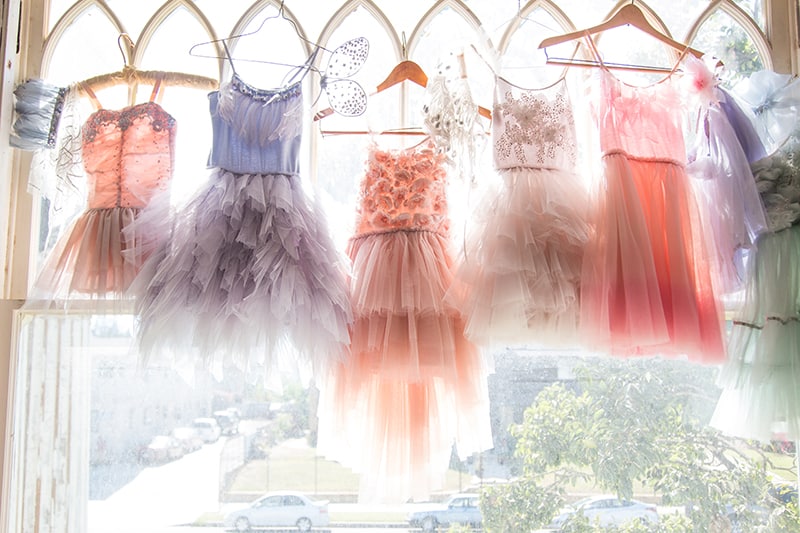
The Feminist’s Guide To Raising A Little Princess
Written by Devorah Blachor
Photography by Photographed by Eliza Logan for Tutu De Monde
Have a child in love with everything frilly, sparkly, and princess-themed, despite your devotion to the opposite? Devorah Blachor, author of the brand-new book The Feminist’s Guide to Raising a Little Princess: How to Raise a Girl Who’s Authentic, Joyful, and Fearless, breaks down six ways to survive and raise a child who thrives.
Our children are born with their own personalities. A parent can influence a child, but we can’t control and shape them according to our preferences. When we try to steer our kids in a particular direction, eventually all parents confront a vexing truth—kids tend to do what they want. That’s why your child takes risks when you’d prefer that they play it safe, and why they might find chewing gum under a table and pop it into their mouths despite your best efforts to stop them.
That’s also why there are meat-loving parents whose kids decide to be vegetarian. There are introverted homebodies whose children prefer to be out partying 24/7. And there are parents like me, feminists who hate everything pink and frilly, with a daughter who is obsessed with Disney Princesses.
If you’re in the same boat as me, fear not. We can work with this. We can’t make their pink predilection disappear—nor should we—but the passion for princesses doesn’t mean our daughters are destined to compromise their dreams. The Disney devotion might not be exactly what we would choose, but princess-obsessed little girls have as much potential as any child. Here are 6 different strategies to bring out the potential of every little princess.
1. Talk about the plots. These days, princess movies are about much more than the “Sleepy Trio” of Snow White, Cinderella and Sleeping Beauty. The contemporary films have terrific themes to explore: Moana’s journey to discover her authentic self, Merida’s questioning of society, and Elsa’s overcoming her fear in order to let her true magic shine—these are all worthy subjects of discussion once your child is old enough.
2. Teach them history. In princess movies, just as in real life, things have changed dramatically for girls and women. Let your daughter know how girls’ choices were severely limited until relatively recently, and how once upon a time, the only path to fulfillment for a girl was through marriage. Discuss how life used to be for girls, and how it still is unfair and oppressive in some places. (Editor’s Note: The Little People, Big Dreams kids’ book series and Rad Women: A-Z is a great place to start.)
3. Let them in on the secret. Our daughters are a few years away from adolescence, when they’ll be bombarded with advertisements and media messages designed to make them feel less than adequate. Explain to your daughter how this kind of manipulation works, and keep discussing how all the images and messages in the media might be affecting them. We can’t change the culture which worships an unrealistic beauty ideal, but we can develop an awareness of how that culture is trying to influence us. Awareness can give girls and women the power to reject the pressures and the messages that adversely influence us.
4. Encourage sports. The benefits of participating in sports and physical activity can’t be overstated: Playing sports has a positive impact on mental and physical health. It shifts the focus from how the body looks to what it can achieve. Being active in sports can prevent chronic diseases such as heart disease and lower rates of substance abuse and risky behaviors. The Women’s Sports Foundation evaluated 1,500 studies on this subject and their report, Her Life Depends On It III, provides a comprehensive review on how important it is for girls and women to engage in physical activity.
5. Apologize and acknowledge that no one is perfect. One of the worrying aspects is that our daughters will get the message that they have to be “princess perfect.” One strategy to avoid them absorbing this damaging message is to discuss our own mistakes as parents openly and honestly, and to apologize. We should let our children know that no one is perfect, and that it’s ok to make mistakes.
6. Develop a strong reading list. There are tons of great children’s books that encourage and empower girls. Some of them are even about princesses. The passion for princesses may be the first of many passions for your child. Their preferences and enthusiasms might surprise us, but this can be one of the best aspects of parenting. Through my daughter, I not only discovered princesses, I realized that instead of fearing them I could learn something new.
Devorah Blachor is the author of The Feminist’s Guide To Raising A Little Princess, and has written columns for The New York Times’ Motherlode, The Huffington Post, McSweeney’s, Redbook, and Good Housekeeping, among many others. Her children Cai and Mari provide endless material for her humor and essays.
For more Mother articles related to this topic, check out our pieces on How To Combat Gender Stereotypes In The Media, How To Raise A Feminist Son, Feminist Books For Kids, and 75+ Feminist-Inspired Baby Names.
Share this story



